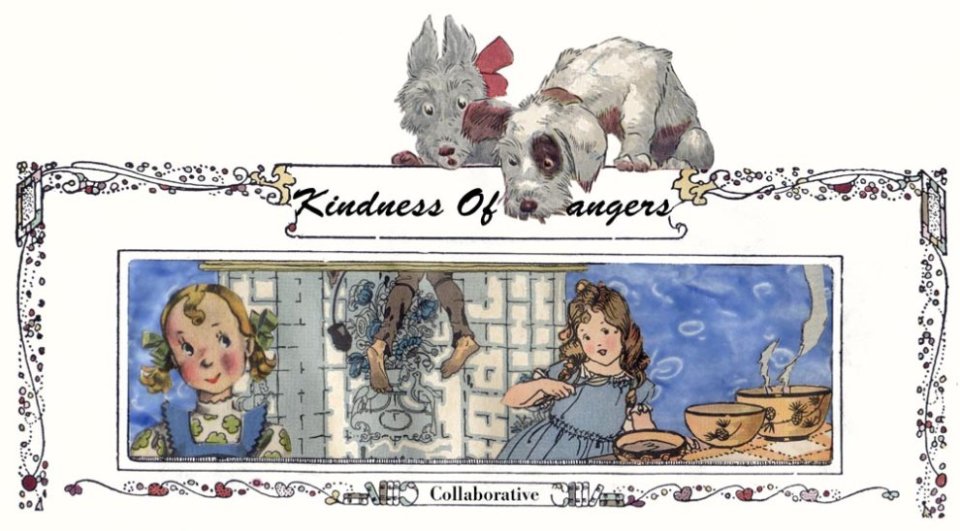The name "Kindness Of Strangers" comes from those very dramatic words uttered by Vivien Leigh as Blanche DuBois near the very end of the 1951 film version of Tennessee Williams' A Streetcar Named Desire. As DuBois takes the arm of the man who is to take her to a mental institution she breathily whispers, "Whoever you are, I have always depended on the kindness of strangers."
Not a one of us has seen the film; but we didn't need to in order to know the line.
The film and that line have permeated popular culture to the point where it has reached iconic status. Not only do we feel we "get it" from this referential culture-point, but the legendary status gives the property such a build-up that one may wish to avoid the film for fear it will not live up to the expectations. But it's not only the film's iconic status which has kept us away from the movie.
Two of the three of us have survived domestic violence personally, and the third has had enough personal interactions with women who have (not to mention she's lived 40-some years as a vulnerable female on this planet) to know understand the realities of such abuse and control.
As with any artistic work, the message is individualized; so while there are plenty of places & persons from which to glean discussion points on the meaning of the film (which we've also managed to avoid), each of us has their own personal interpretation of the film and that famous line.
Some hear a waifish, needy, vulnerable, female, exhibiting kitten-esque qualities to receive help; others hear a purring predatory feline who manipulates. Is it the dual-sided coin, both a vocalization with intent and message heard? If so, which is which? Is one truth? Both? Is one rewarded by society -- and if so, which & how? And isn't it ultimately irony; in either case the woman becoming a pet? ...But then, does pet or master have control?
Is "Whoever you are, I have always depended on the kindness of strangers" a self-actualized statement on the part of Blanche DuBois? Since she's a character, is it most accurate to see this as a statement regarding Tennessee Williams? What did Vivien Leigh think saying that line? Did she resonate with it, know it herself somehow, or did ask for the author's help -- was she forced to take his (or another's) direction?
Shades of DuBois' dependence, yes?
As this relates to art, for us anyway, is the matter of success. Is art a success when the artist is satisfied with the work, the message? Or must the message be received as intended in order for that to take place? If that is reflected in any way with sales of art, does that mean art is only a success when it sells? Does the form it sells in, original or copy, matter? If so, to whom -- the artist? The Buyer? What is the relationship between artist, art and 'the public'? Who is in control of art and its creation?
Each of the members of the collaborative art effort dubbed Kindness Of Strangers is also a paid writer. We use our words (as you can clearly see here) to communicate our messages. We've long pondered these questions with our craft -- even more intensely since the advent of self-publishing (i.e. blogging), where our interaction with readers was without obvious gatekeeper and our benchmarks for popularity (and monitoring of it) was equally unobstructed. But it was time for a change, to push ourselves. Not just by learning a craft, but to push ourselves personally in other ways. And that will be for the next member to articulate.
For now I'll leave you with this clip; it is the very first time I've heard/seen the line as in the film:
Friday, December 5, 2008
Kindness Of Strangers: The Name
Posted by Anonymous
Labels:
Art,
Kindness Of Strangers
![]()
Subscribe to:
Post Comments (Atom)






1 comments:
Streetcar is about so many things I don't want to minimize it by focusing on just one point or one interpretation. Hopefully, since this was written, your curiosity got the better of you and each of you have seen at the very least the entirety of this classic adaptation of one of the best American plays ever, or better yet a good, live stage performance.
I found your essay very interesting, in part, because of what it says about how some snippets of great work tend to take on a life, and some interpretations that are not especially rooted in the original work itself. In context, Blanche's comment comes out as a heartbreaking statement of the dangers or trusting strangers and engaging in fantasies about how people will behave, but also a statement about a kind of fantasy world that Southerners created for themselves, and a mythos that continues to reverberated in personal politics, especially in the U.S.
Of course, this is only one of many possible readings.
Post a Comment